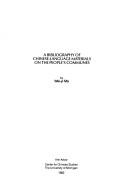| Listing 1 - 3 of 3 |
Sort by
|
Book
ISBN: 9780231546751 0231546750 9780231186667 9780231186674 0231186665 9780231186667 0231186673 9780231186674 Year: 2018 Publisher: New York
Abstract | Keywords | Export | Availability | Bookmark
 Loading...
Loading...Choose an application
- Reference Manager
- EndNote
- RefWorks (Direct export to RefWorks)
China's dismantling of the Mao-era rural commune system and return to individual household farming under Deng Xiaoping has been seen as a successful turn away from a misguided social experiment and a rejection of the disastrous policies that produced widespread famine. In this revisionist study, Joshua Eisenman marshals previously inaccessible data to overturn this narrative, showing that the commune modernized agriculture, increased productivity, and spurred an agricultural green revolution that laid the foundation for China's future rapid growth. Red China's Green Revolution tells the story of the commune's origins, evolution, and downfall, demonstrating its role in China's economic ascendance. After 1970, the commune emerged as a hybrid institution, including both collective and private elements, with a high degree of local control over economic decision but almost no say over political ones. It had an integrated agricultural research and extension system that promoted agricultural modernization and collectively owned local enterprises and small factories that spread rural industrialization. The commune transmitted Mao's collectivist ideology and enforced collective isolation so it could overwork and underpay its households. Eisenman argues that the commune was eliminated not because it was unproductive, but because it was politically undesirable: it was the post-Mao leadership led by Deng Xiaoping-not rural residents-who chose to abandon the commune in order to consolidate their control over China. Based on detailed and systematic national, provincial, and county-level data, as well as interviews with agricultural experts and former commune members, Red China's Green Revolution is a comprehensive historical and social scientific analysis that fundamentally challenges our understanding of recent Chinese economic history.
Green Revolution --- Communes (China) --- Agriculture --- Agriculture and state --- S10/0525 --- S20/0720 --- Revolution, Green --- Agricultural innovations --- Food supply --- Grain --- People's communes (China) --- Ren min gong she (China) --- Renmin gongshe (China) --- Economic aspects --- China: Economics, industry and commerce--Rural industry --- China: Agriculture forestry, fishery, natural disasters--Communes (agrarian aspects) --- E-books

ISBN: 0892640448 0472127810 047290177X 9780472127818 Year: 1982 Publisher: Ann Arbor University of Michigan. Center for Chinese studies
Abstract | Keywords | Export | Availability | Bookmark
 Loading...
Loading...Choose an application
- Reference Manager
- EndNote
- RefWorks (Direct export to RefWorks)
A research tool for scholars studying modern China, particularly those focusing on the post-1949 communal system and economy. The work includes full bibliographic references to some 2,800 essay, articles, pamphlets, and other materials in Chinese taken from more than 130 publications, primarily from mainland. The entries are arranged are arranged topically with annotations. Includes a geographic index to the communes referred to in the listed items.
Communes (China) --- S11/0100 --- S11/0535 --- S20/0100 --- S20/0250 --- People's communes (China) --- Ren min gong she (China) --- Renmin gongshe (China) --- Periodicals&delete& --- Bibliography --- China: Social sciences--Bibliographies, dictionaries, yearbooks and collections --- China: Social sciences--People's Communes --- China: Agriculture forestry, fishery, natural disasters--Bibliographies, dictionaries, yearbooks and collections --- China: Agriculture forestry, fishery, natural disasters--General works: since 1949 --- Periodicals --- Bibliography. --- Chinese periodicals --- Indexes.
Book
ISBN: 052091189X 1282356089 9786612356087 0585131392 9780520911895 9780585131399 Year: 1991 Publisher: Oxford University of California Press
Abstract | Keywords | Export | Availability | Bookmark
 Loading...
Loading...Choose an application
- Reference Manager
- EndNote
- RefWorks (Direct export to RefWorks)
This is a study of peasant-state relations and village politics as they have evolved in response to the state's attempts to control the division of the harvest and extract the state-defined surplus. To provide the reader with a clearer sense of the evolution of peasant-state relations over almost a forty-year period and to highlight the dramatic changes that have taken place since 1978,1 have divided my analysis into two parts: Chapters 2 through 7 are on Maoist China, and chapters 8 and 9 are on post-Mao China. The first part examines the state's grain policies and patterns of local politics that emerged during the highly collectivized Maoist period, when the state closed free grain markets and established the system of unified purchase and sales (tonggou tongxiao). The second part describes the new methods for the production and division of the harvest after 1978, when the government decollectivized agriculture and abolished its unified procurement program.
Communes (China) --- Peasants --- Elite (Social sciences) --- Local government --- Collective farms --- Grain trade --- Communism --- Produce trade --- Peasantry --- Agricultural laborers --- Rural population --- Marks (Medieval land tenure) --- Villeinage --- People's communes (China) --- Ren min gong she (China) --- Renmin gongshe (China) --- Government policy --- 1970s. --- academic. --- agriculture. --- analysis. --- asia. --- asian history. --- chinese history. --- class structure. --- class system. --- collectivism. --- culture. --- dynasty. --- food production. --- harvest. --- international history. --- local politics. --- maoist china. --- maoist period. --- peasant. --- political. --- politics. --- production. --- scholarly. --- small town. --- social studies. --- village. --- world history.
| Listing 1 - 3 of 3 |
Sort by
|

 Search
Search Feedback
Feedback About UniCat
About UniCat  Help
Help News
News